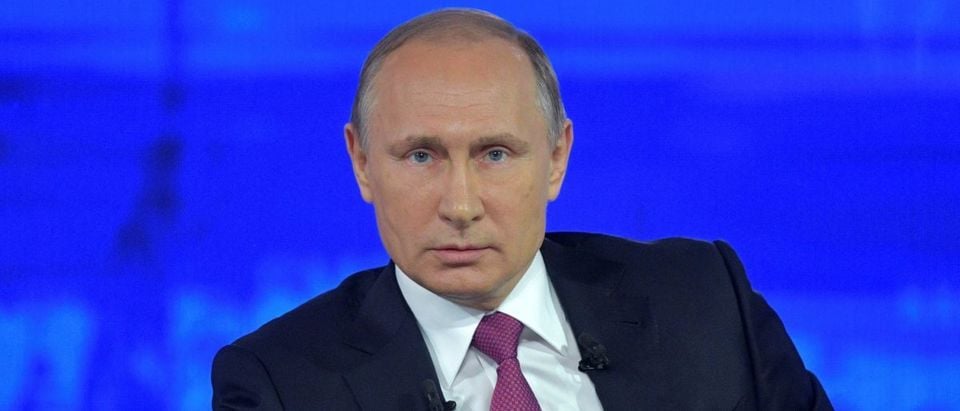Since last November, Democrats and their allies in the mainstream media have obsessively shifted blame for their improbable election loss to Russia, pointing to Russia’s suspected role in leaking hacked Democratic National Committee emails to Wikileaks.
While the delightful irony of the Left morphing into anti-Russia hawks shouldn’t escape those of us who spent decades resisting appeasement of the Soviet Union, we shouldn’t outright dismiss Russia’s interest in influencing U.S. policy, either. Of course, had Russia not been implicated in the DNC hacks, the American Left would have continued its neo-appeasement policy, best exemplified by President Obama’s 2012 hot mic moment when he instructed outgoing president Dmitry Medvedev to relay to incoming President Putin that Obama would have “more flexibility” after his reelection.
The leaked DNC emails’ effect on the outcome of the election is impossible to measure—most political experts on the right and left will tell you that it was at most negligible. Regardless, what is abundantly clear is that Putin’s Russia has been actively trying to influence U.S. public policy for years.
To be fair, it didn’t start with Putin. Russia has been in the business of influencing Americans’ beliefs and indirectly our electoral decisions for 100 years. Virtually every faction of the 60s era Left got its Marxist talking points from Moscow, and many of the themes pervading mainstream liberal schools emanated from Russia.
A great example of Russia’s influence on American politics is that Bernie Sanders—the senator who could have been a major party’s presidential nominee, were it not, according to some of his supporters, for the DNC’s “rigged” primaries, allegedly exposed (again perfectly ironically) by Russia—made comically absurd overtures to a totalitarian state when he was the mayor of Burlington.
The evidence of Russia’s prolific history of meddling in U.S. politics is incontrovertible. And it would behoove our elected leaders to shed some light on this insidious foreign influence. A good starting point is Russia’s financial ties to powerful anti-fracking and anti-oil lobbies in the United States.
The evidence is overwhelming—and laid out in my recent report, Russia’s Ties to U.S. Environmentalist Groups, published by the Center for Freedom and Prosperity—even if the graph connecting the dots between Moscow and U.S.-based environmental advocacy groups is non-linear, and at times as one would expect, obfuscated.
Let’s consider motive. What is Russia’s interest in meddling in U.S. energy policy?
It’s simple, really. The fracking revolution has played a central role in driving down global oil prices, which has significantly hampered Russia’s oil-centric economy. So what’s bad for fracking is good for Russia.
But as anyone who watches Perry Mason reruns will tell you, motive is insufficient in proving guilt.
Also included in my report is concrete evidence to solidify the case.
The full story involves an organization called Sea Change Foundation that bundles millions for radical, left-wing environmentalist groups determined to stop all oil and natural gas development in the U.S. Such bundling is not illegal, and not necessarily nefarious by itself, but the foundation is fed by a paper organization called Klein Ltd. based out of a Bermuda law firm, Wakefield Quin, run by Putin cronies.
As the Washington Free Beacon meticulously documents, Wakefield Quin clients include 20 companies and investment funds with ties to the Russian government. Two of founders of Klein Ltd., one of whom is also a Wakefild Quin senior counsel, also happen to be executives of Spectrum Partners Ltd., a fund with offices in several countries, including Moscow, with a portfolio that’s heavy on Russian securities.
If Klein and Sea Change aren’t the smoking guns linking Putin to left-wing environmentalist groups, they’re at the very least the warm pistols left at the scene of the crime.
To see the lengths Russia is willing to go to in order to affect global oil and gas markets, we need only consider its well documented role in the building of the “South Stream” pipeline to Bulgaria.
As The New York Times (to its credit) reported in 2014, shortly after Russia annexed Crimea, Bulgaria’s parliament drafted legislation sanctioning a gas pipeline from Russia to Bulgaria. The legislation was largely written by Russia’s state-owned energy giant, Gazprom, and was spearheaded by Putin’s energy minister, with the explicit intent of enriching Putin and his cronies.
Russia’s funding of left-wing U.S. environmentalist groups is a relatively passive gambit compared to the Bulgaria scandal, but that’s all the more reason to suspect more is yet to come.
Congressmen Lamar Smith and Randy Weber, both of whom chair energy-related House panels, recently sent a letter to Treasury Secretary Mnuchin asking for the Department to investigate “evidence that Russia is also behind the radical statements and vitriol directed at the U.S. fossil fuel sector.” It’s a good start, but will require follow-up action.
We know that Putin is fanatically committed to expanding Russia’s sphere of influence and strengthening her economic position. We know the risk U.S. fracking poses to Russia’s economy, and we know of direct Russian ties to firms that contribute tens of millions of dollars to environmental extremists.
As Democrats and their media friends continue to obsess over Trump surrogates’ ties to Russia, it’s incumbent on everyone else to further examine Russia’s ties to anti-fracking groups. After all, we wouldn’t want a foreign power to influence our public policy. Or elections.
Eugene Slaven is a freelance writer, a former Charles Koch Institute Associate, and former Associate Director at the Center for Freedom and Prosperity. He is the author of the comedy novel “A Life of Misery and Triumph” and the self-help guide “Enemy Thoughts.”


